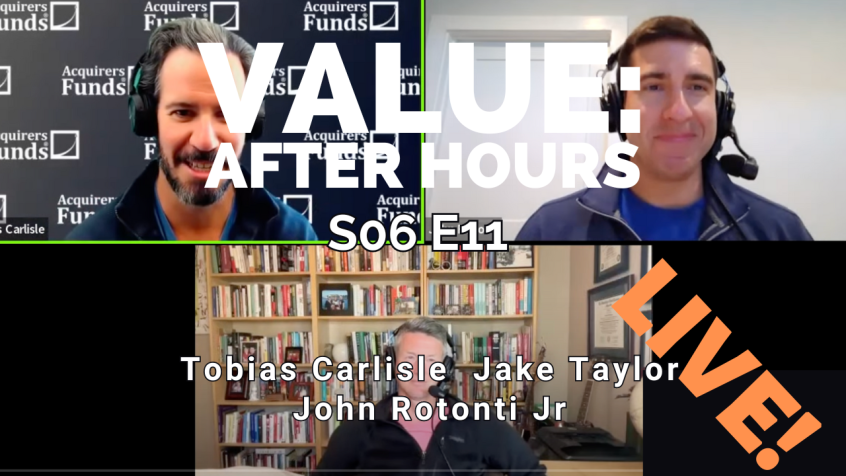During their latest episode of the VALUE: After Hours Podcast, Carlisle, Taylor, and John Rotonti Jr discussed Unveiling the Best Predictor of Stock Market Performance. Here’s an excerpt from the episode:
John: Yeah, that’s true. That was awesome. My question is, if everything is a complex adaptive system, which I think it is, markets and economies especially, and we can’t predict the future because of that, what do we do as investors? That’s a conundrum which makes investing hard. In the last couple of years, investing doesn’t seem that hard. If you own a tech index, you’re doing great.
Tobias: If you own SPY, you’re doing pretty well.
John: Exactly. If you’re doing SPY, you’re doing very well. Yeah. But it turns out, it is hard because everything is hard to predict. Yet, as investors, we’re trying to make predictions. That’s what we’re trying to do. We’re trying to see which stocks are going to be higher in the future. That’s a prediction.
Jake: My mind goes to an insurance analogy, because that is also about predicting the future. It’s about what risks are you taking?
John: Absolutely.
Jake: Are you being properly compensated to take that risk? I think there’s a couple of different smart ways to do it. I think you could think of it like auto insurance, let’s say, GEICO as a for instance. And I would like actually what Toby does to GEICO, which is, you don’t know exactly which of the policies that you write is going to be profitable or not. But you know that as a base large numbers expected outcome that you– you have a little bit of an edge there just based on what you’re choosing, you’re probably arbitraging some behavioral bias. It’s going to end up working out okay, and you’ll probably do a little bit better than average because of that.
And then I think occasionally, markets throw off just absolute no brainer things that just don’t make any sense to even a reasonably intelligent businessperson who’s looking at the situation. You get paid really well to do that. And recognizing those, you have to hang around and see them enough to find them. But they’re very, very rare. I would liken that then to specialty insurance, like a [unintelligible 00:40:27] is writing where there’s these mispriced things where like, “Okay, we’re getting a ton of premium relative to what we feel like the risk is that we’re underwriting.”
You just have to be very discerning at that point and recognize that it’s reasonably rare that those get thrown up. But they do on occasion present themselves. And so, I think both of those make sense to me as ways to mitigate the uncertainty of the future.
John: That’s how I deal with it, especially the way that Tobias does. There’s overwhelming research. I shared I think a dozen slides on X at one point in time. I can send this to, y’all, showing that high free cash flow yield is far and away or owner earnings yield, whatever you want to call it, is far and away the best predictor of forward rate of return. Far and away. Bank of America looked at 40 metrics. This was about seven or eight years ago, but it looked at 40 metrics. And free cash flow to enterprise value outperformed the market by the most.
Manning & Napier, T Rowe Price, several other firms, like I said, there’s a dozen slides that I sent all showing that high free cash flow yield is far and away the best predictor of market outperformance over a five-year period. Far and away. So, it’s empirical.
Tobias: I think it varies a little bit depending on the date that you do it. But free cash flow, it’s free cash flow or it’s operating income, or it’s operating cash flow, or it’s one of those more broader based earnings measures than just the PE right at the very bottom of their statement. But I think the interesting thing is how predictive it is. So, that’s one thing that I’ve spent a lot of time looking at, how far out can you–?
So, I always thought quality, and there’s lots of different definitions of quality, but we know return on equity is pretty mean reverting, but there are other measures of quality, some of which are less mean reverting. But of all of them, I can’t find anything that really has any predictiveness that is anywhere near just the price ratio. So, price to free cash flow to EV say, that is predictive out to about five years. Beyond five years, nothing’s predictive. And it’s only the price ratios out to about five years. The quality metrics, funnily enough, seem to break down pretty quickly or I can’t find the–
John: No, that’s what the research shows. So, the 40 metrics that Bank of America looked at weren’t just valuation. It was quality ratios, profitability ratios, growth ratios and free cash flow yield. Far and away was the best predictor of five-year performance.
You can find out more about the VALUE: After Hours Podcast here – VALUE: After Hours Podcast. You can also listen to the podcast on your favorite podcast platforms here:
For all the latest news and podcasts, join our free newsletter here.
Don’t forget to check out our FREE Large Cap 1000 – Stock Screener, here at The Acquirer’s Multiple:



